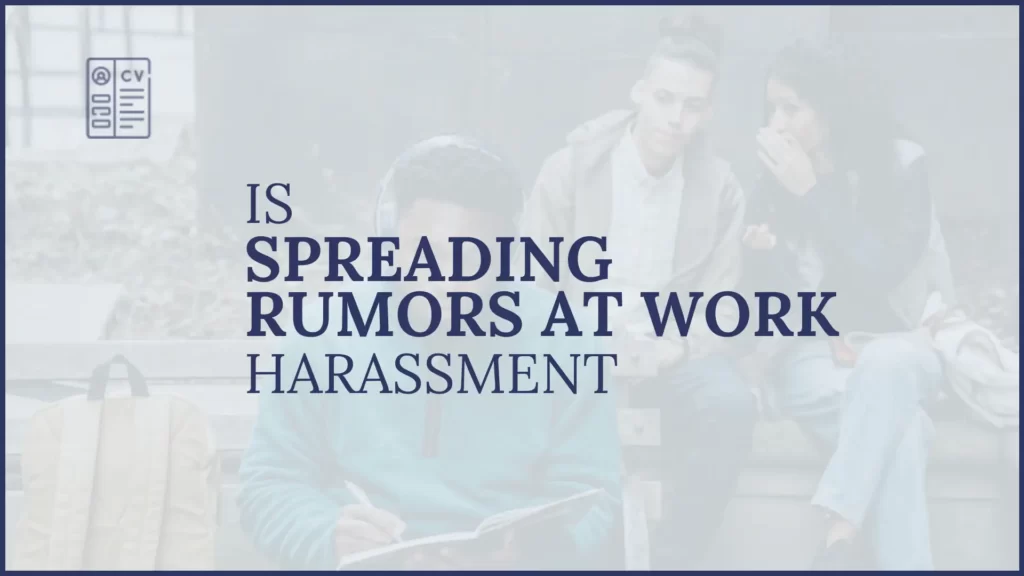Have you ever wondered whether spreading rumors at work can be considered harassment? Spreading rumors at work is a serious matter and can have damaging effects on the targeted individual and the overall work environment. Not only can it create a hostile and toxic workplace, but it can also lead to legal implications for the perpetrator. In this blog post, we will delve into the topic of spreading false rumors at work and explore whether it constitutes harassment. We will also discuss the potential consequences for both the perpetrator and the victim. Stay tuned to gain a better understanding of this crucial workplace issue.
Key Takeaways:
- Spreading rumors at work can constitute as harassment: When false or damaging information is spread about a colleague in the workplace, it can create a hostile environment and negatively impact the targeted individual’s job performance and overall wellbeing. This behavior can be considered a form of harassment and is not acceptable in any professional setting.
- It can lead to legal consequences: Spreading rumors at work can result in legal consequences for both the individual spreading the rumors and the organization. Victims of this behavior may take legal action under anti-discrimination and harassment laws, and companies may be held liable for failing to address and prevent such conduct in the workplace.
- Employers must take proactive measures to prevent and address rumors: It is essential for employers to have clear policies in place regarding harassment, including spreading rumors, and to educate employees about the serious implications of engaging in such behavior. Additionally, employers must take immediate action to address any instances of rumor-spreading in the workplace and provide support to affected employees.
Examining the Nature of Rumors

Assuming rumors are a common occurrence in your workplace, it’s important to understand their nature and the potential impact they can have. Rumors can spread like wildfire and can cause significant harm to individuals and the overall work environment. It’s crucial to examine the nature of rumors to better understand how to address them effectively.
Definition and Types of Rumors
Rumors can be defined as unverified information or stories that are spread from person to person within a workplace. There are different types of rumors, including substantive rumors (relating to a specific event or outcome), affective rumors (influencing emotions or attitudes), and process rumors (pertaining to how things are done or will be done). This can include anything from salacious gossip about a co-worker to speculation about company layoffs or changes in leadership.
- Substantive rumors: Relate to a specific event or outcome
- Affective rumors: Influence emotions or attitudes
- Process rumors: Pertaining to how things are done or will be done
This breakdown helps to understand the different ways in which rumors can manifest and the potential impact they can have.
The Psychology Behind Spreading Rumors
Understanding the psychology behind spreading rumors is crucial in addressing this issue. Rumors often stem from a desire for social interaction and the need to feel a sense of importance. When individuals spread rumors, they may not always be aware of the potential harm they are causing. Additionally, when people are anxious or uncertain about a situation, they may be more prone to spreading rumors as a way to gain a sense of control or understanding.
Legal Perspective on Rumors as Harassment
Obviously, spreading rumors at work can have legal implications, especially if it crosses the line into harassment. The law is very clear that harassment in the workplace, whether it is based on rumors, gossip, or any other form of communication, is unlawful and can result in severe consequences for the perpetrator.

Laws Governing Workplace Harassment
When it comes to workplace harassment, there are several laws in place to protect employees. These include Title VII of the Civil Rights Act of 1964, which prohibits harassment based on race, color, religion, sex, or national origin. Additionally, the Equal Employment Opportunity Commission (EEOC) enforces laws that prohibit harassment based on age, disability, genetic information, and retaliation for reporting, participating, or opposing discrimination. It’s important to understand these laws and how they apply to rumors and gossip in the workplace.
Case Studies and Legal Precedents
There have been numerous cases where spreading rumors at work has been found to constitute harassment. For example, in Case Study 1, a supervisor spread false rumors about a subordinate’s personal life, creating a hostile work environment. In Case Study 2, an employee suffered severe emotional distress after being targeted by malicious rumors, leading to a successful legal claim for damages. These cases highlight the serious impact that rumors can have and the legal precedents that support taking action against such behavior.
- Case Study 1: Supervisor spreading false rumors leading to a hostile work environment
- Case Study 2: Employee suffering emotional distress due to malicious rumors
Addressing and Preventing Rumor-Based Harassment
Now that it’s clear how destructive spreading rumors at work can be, let’s discuss some strategies to address and prevent this form of harassment. By taking a proactive approach to rumor-based harassment, you can create a healthier and more respectful work environment for everyone.
Role of Management in Mitigating Harmful Rumors
As a manager, it’s your responsibility to mitigate the harmful effects of rumor-based harassment in the workplace. You have the power to set the tone for the company culture and enforce policies that promote a respectful and inclusive environment. When you take a firm stance against rumor spreading, you send a message that this behavior will not be tolerated. Additionally, providing clear channels for reporting harassment and offering support to those affected by rumors can help prevent the escalation of these damaging situations.
Strategies and Policies to Counteract Rumor Spreading
One effective strategy for countering rumor spreading is to promote transparency and open communication within the workplace. Encouraging employees to speak directly and honestly with one another can help dispel false information before it gains traction. Implementing clear policies against spreading rumors and providing thorough training on the impact of harassment can also help prevent this behavior. By creating a culture of accountability and respect, you can empower your employees to take a stand against rumor-based harassment.
By addressing the role of management in mitigating harmful rumors and implementing strategies and policies to counteract rumor spreading, you can create a workplace environment that is safe, respectful, and inclusive for all employees.
Conclusion – Is Spreading Rumors At Work Harassment
To wrap up, spreading rumors at work can indeed be considered a form of harassment. It creates a toxic and hostile work environment, can damage a person’s reputation and mental well-being, and ultimately affects their ability to perform their job effectively. Whether the rumors are based on truth or not, the act of spreading them without concrete evidence is detrimental and can have legal implications.
It’s important to remember that your actions in the workplace have a direct impact on those around you, and spreading rumors is a violation of their rights and can lead to serious consequences. It’s crucial to uphold professional and ethical behavior in the workplace and refrain from engaging in any form of malicious behavior. Remember, creating a positive and respectful work environment is everyone’s responsibility.
FAQ
Q: What constitutes spreading rumors at work?
A: Spreading rumors at work involves the unauthorized or unverified sharing of information about a colleague’s personal or professional life, often with the intent to damage their reputation or create a hostile work environment.
Q: Is spreading rumors at work considered harassment?
A: Yes, spreading rumors at work can be considered a form of harassment, as it can create a hostile or intimidating work environment for the individual being targeted.
Q: What are the potential consequences of spreading rumors at work?
A: Spreading rumors at work can lead to disciplinary action, including verbal or written warnings, suspension, or termination, depending on the severity and impact of the rumors on the targeted individual and the overall work environment.
Q: How should I respond if I am the target of rumors at work?
A: If you are the target of rumors at work, it is important to document the instances of spreading rumors, report the behavior to your supervisor or HR department, and seek support from colleagues or a professional counselor to address the impact on your well-being.
Q: What steps can employers take to prevent spreading rumors at work?
A: Employers can prevent spreading rumors at work by maintaining a zero-tolerance policy for harassment, providing anti-harassment training for employees, encouraging open communication, and promptly addressing any instances of spreading rumors to create a respectful and inclusive work environment.

